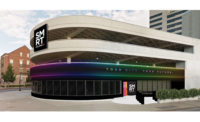Four Cities Will Receive Smart Intersection Technology

Parsons will deploy smart intersection technology in four cities. Photo courtesy of Parsons
Reflecting the anticipation of automated vehicles and the trend toward "Smart City" applications, four cities will begin deploying technology provided by Parsons Transportation Group, with Amazon Web Services, on intersections this summer. Parsons announced this month that Fort Smith, Ark.; Austin, Texas; Westminster, Colo., and Walnut Creek, Calif., will receive its Intelligent Intersections solution free for one year.
The cities were chosen out of a group of semifinalists announced last fall. The other contenders in the "Smart Cities Challenge" were Anne Arundel County, Md.; Dubai Roads and Transport Authority, United Arab Emirates; Manama, Bahrain; Mississauga, Ontario; Pasadena, Calif.; and the Regional Transportation Commission of Southern Nevada.
The solution takes data already gathered at intersections from the signal controller unit and other local sensors and provides a dashboard that allows engineers to visualize the data. It also features an algorithm that provides recommendations on re-timing traffic signals, which can significantly reduce congestion and increase safety at intersections. In addition, connected vehicles can communicate with traffic signals, which Parsons says will lead to more efficient and environmentally friendly driving with a smaller carbon footprint. Traffic signal owners can also provide priority to transit and emergency vehicles or automatically extend green cycles for pedestrians needing extra time to cross the street.
Many municipalities are experimenting with similar initiatives. For example, the Georgia Dept. of Transportation has invested in signal software to connect all traffic signals statewide and gain real-time diagnostic information, including pavement conditions. In Tampa, Fla., a $25-million federally funded project includes testing radar and cameras to examine traffic patterns and then post appropriate speeds, LiDAR to track pedestrian movements at crosswalks and warning signals to avoid collisions between vehicles and streetcars.
“One of the primary reasons that we applied for this trial project is that our communities suffer from enduring high rates of poverty, low educational status and poor health outcomes well above the national averages,” says Reese M. Brewer, director of the Frontier Metropolitan Planning Organization in Arkansas. “This opportunity gives our team the chance to stand alongside and interact directly with leading traffic experts to provide meaningful and lasting solutions to not only existing intersection deficiencies, but also to ultimately revolutionize mobility for all.”
Brewer says as a regional employment center, Fort Smith’s 90,000 population increases to almost 200,000 during the work week. “Fatalities, severe injuries and red-light running are common on the selected project corridor, Rogers Avenue, costing lives, economic losses and societal damages.”
On a five-mile stretch of Rogers Avenue with 21 traffic lights, “during 21 days in 2016, the City of Fort Smith Police Department issued 640 tickets for traffic signal violations,” Brewer notes. “From 2014 to 2017, a total of 153 traffic accidents occurred and showed that red-light running caused seven percent of these collisions and fatalities. This technology will aid us to rectify problematic intersections and create more efficient means to navigate throughout the city. Further, the data collected from this effort will track and monitor intersection performance.”



